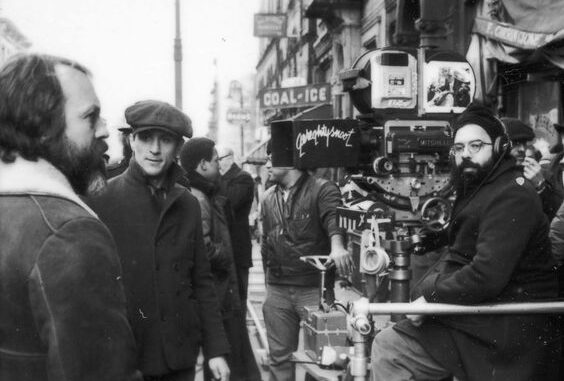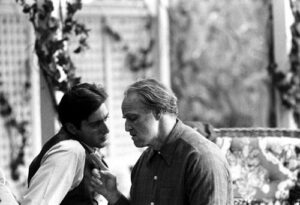
The Art Of Betrayal – The Godfather: Part II

Lucky I’m not writing on paper here, because the ink would be smudged with tears. I’m not going to wait for the conclusion to say it. This is the greatest film. Ever. Of all time. Personally, I find this far more beautiful than the Mona Lisa or The Last Supper, just because it’s so extraordinary. No offence to people who like paintings, but paintings suck.
The Godfather: Part II follows on from the first, and Michael Corleone (Al Pacino) has been head of the family for seven years now. Partnering with Jewish businessman Hyman Roth (Lee Strasberg), Michael looks to expand into Cuba, but with lurking danger and an attempted assassination, he realises he can trust no one, whether that be his family or his ‘family‘. While The Godfather is Michael’s initiation to becoming the don, Part II is about his struggles, self destruction and moral demise.
What’s great about Part II is that it isn’t a sequel. I think both the films compliment each other nicely, and I would, of course, advise watching the first – it gives it backstory and context and you’ll understand what’s going on – but Part II is easily a stellar film in it’s own right. Is it better than the first? Yes. It’s darker, more profound, more raw, more expansive. The Godfather is good, perhaps a little outdated. The Godfather: Part II is just… I’m lost for words.
Why is it better? It think part of it is to do with the fact that this isn’t an adaptation of a book, but taking Mario Puzo’s character and Francis Ford Coppola being allowed to create his own story around it. He had more freedom and, as the brilliant film maker he is, made Part II something to behold. Coppola’s run from The Godfather, to The Conversation, to The Godfather: Part II, to Apocalypse Now, must surely be one of the greatest film runs in such a short period of time – just seven years. Wouldn’t mind that on my CV.
The pacing of the film is also excellent. Cutting between the story of young Vito (Robert De Niro) and Michael is perhaps one of the greatest decisions in the history of cinema. The juxtaposition between the two helps emphasise Michael’s degrading morals and humanity. De Niro’s performance is incredible, although his raspy Godfather voice was no Marlon Brando. We see his troubled past, and how he ends up in such a position of power. In the end, it was all based on luck and quick wits.
But what we also see is that Vito is not out for the power. What he cares about is family. And while he commits crimes, he is respectful and mild mannered. Everything he does is done out of love, and to protect those who are close to him – something he held true to for all his life. When he kills Fanucci, it is to save his new family, and when he kills Ciccio, it is to avenge his old. We see his close connection to a young Michael, and his burning desire to put his brood before anything else. He wants them to be happy. He’s likeable, he’s courteous and he’s a very good businessman.
Michael is pretty much the exact opposite of this. Although he thinks he’s doing his crimes for his children and wife and siblings, he’s lost sight of it. In the first Godfather, he’s fresh faced, patriotic, handsome and the pride of the family. We get to see that with the flashback below:
It sums up the family amazingly.
After his brothers leave the room, Michael sits alone at the table. We then cut back to Michael, staring out over the lake, his dead brother’s corpse lying on a boat. His eyes are cold, ruthless, emotionless. He’s got deep, dark bags, his hair is greying, he’s world weary. Fighting in the marines or in World War 2 didn’t change him, but leading the Corleone family and fighting mob wars has.
When we found out Kay (Diane Keaton) had an abortion because she didn’t want to bring his son into the world, we know Michael will never trust or forgive anyone again. He knew Fredo (John Cazale) didn’t have the capabilities or the intelligence to harm or threaten him ever again, but he still orders him to be killed. Michael feels he must wipe out all his enemies off the planet. He needs absolute safety. Absolute certainty that he’ll win. He needs absolute power. Even if that means destroying families – namely, one: his own.
Michael
Vito never forgets who he is. He was proud of his son because he wasn’t involved in his business, because he fought in the war, because he believed he could go on to do greater things. But who would the next Godfather be? All his children are flawed. Fredo lacked brains and courage, Sonny was too hot headed, and Tom wasn’t leader material or true blood. But what they all had was understanding of the Corleone way of life. That morality of family balances out the evils they commit. An example of this is when Frank Pentangeli, who is brilliantly played by Michael V. Gazzo, sees his brother in the hearing at the almost McCarthy-like testimony. From that point, he could never confess. Michael doesn’t have this understanding. The truth is, Michael was never the right man for the job. And, perhaps, deep down, this is why Vito favoured him the most.
Is The Godfather: Part II about the mafia? I don’t think it is, and certainly less than the first. It’s the life long struggle of one man. He seems resentful of the fact that he has to put other people and this ‘business’ bestowed upon him before himself. His father’s empire was built upon strength and respect. His is built upon fear and treachery. While Don Vito overthrew the totalitarian Fanucci to save his slum and bring a better life for everyone, Michael inherits Vito’s throne, but has sadly become more like Fanucci. Michael says, “My father taught me many things.” But he failed to learn his father’s most important lesson.
Michael is pretty much the perfect antihero – a protagonist who’s also the malignant force within the story. Obvious examples would be Tony Soprano, Marty Byrde or Walter White. Audiences root for the antihero, but can end up being dragged down into a black lagoon. Personally, I love them. They’ve moulded some of the greatest films and, usually, TV shows ever made. But the biggest problem that comes with an antihero is the finale. There are two options: either, their death, or something worse than death. Michael gets his just desserts – isolation, alienated from everyone. He lacks the thing that’s at the heart of the story – family. The death of his brother, destruction of his sister, and banishment of his wife from his children’s lives is a pretty good ending for me.
